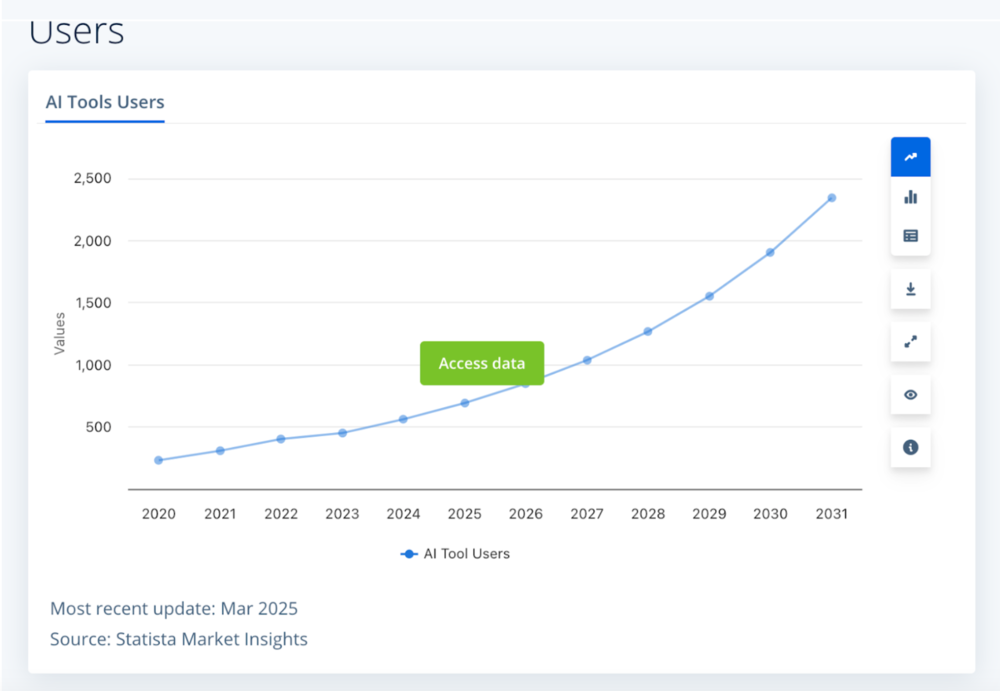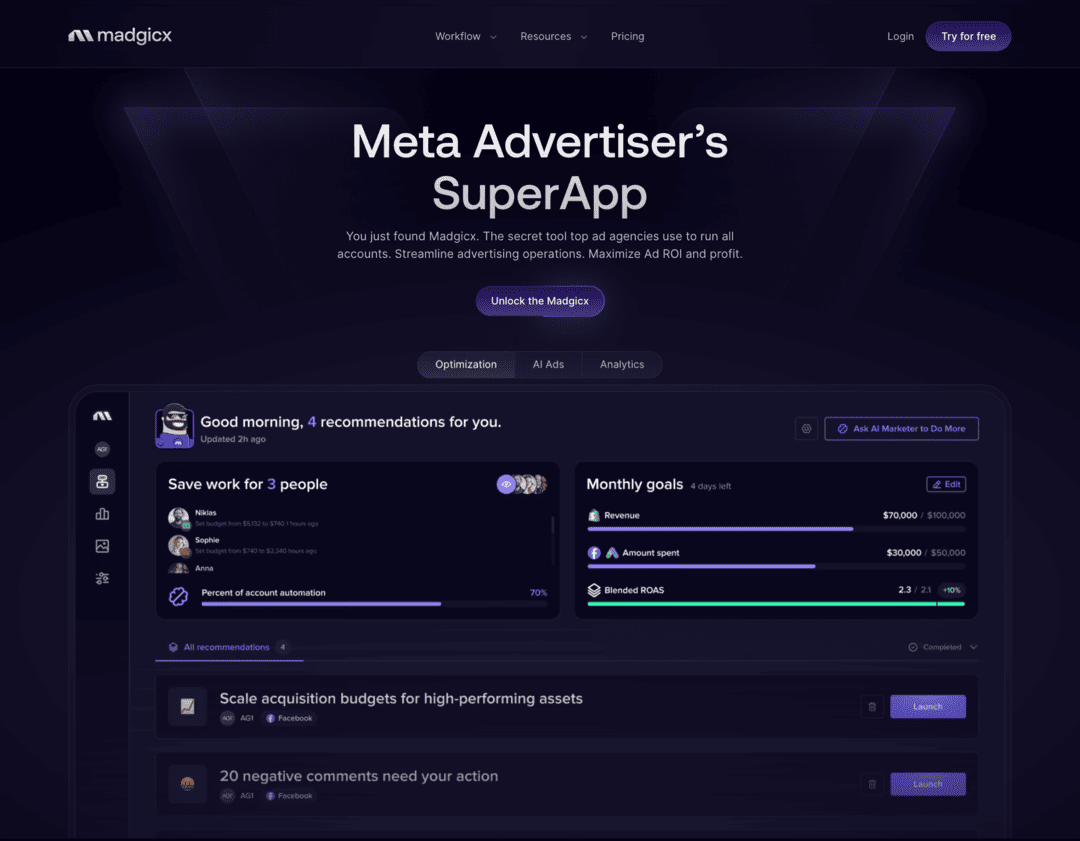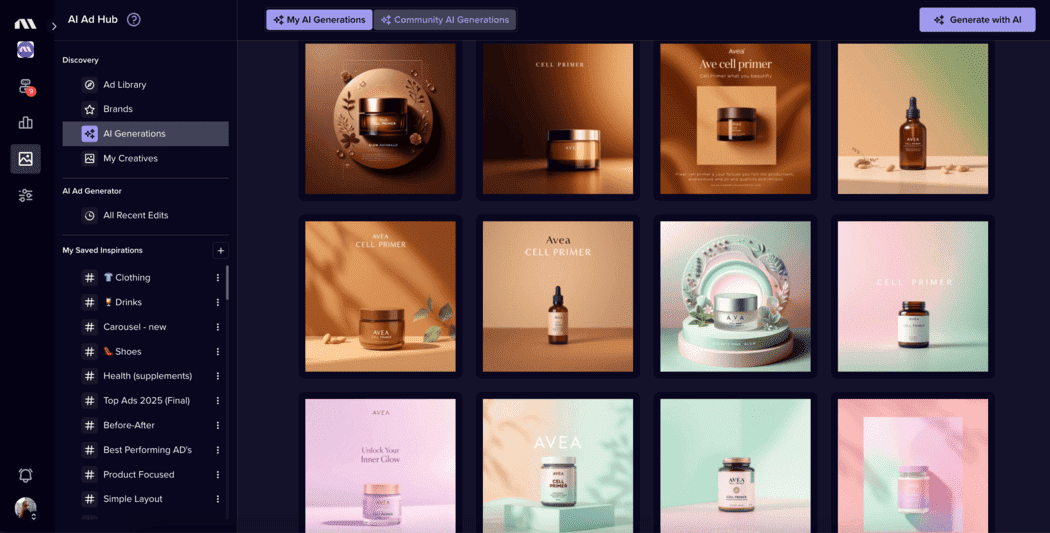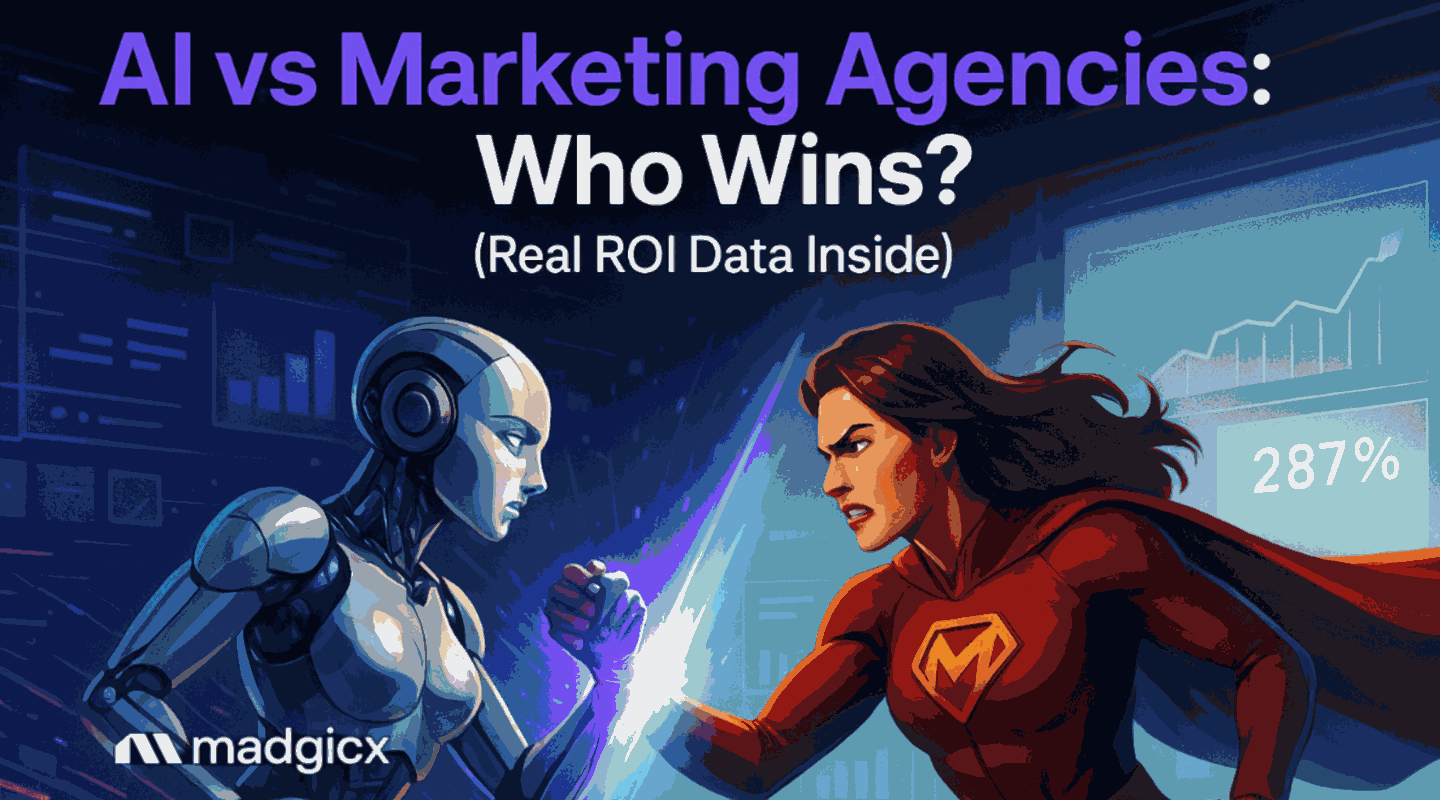AI vs Marketing Agencies: Which delivers better ROI? Explore performance data, cost comparisons, and strategies to optimize your marketing budget.
You're staring at your Q1 budget allocation spreadsheet at 11 PM, coffee gone cold, trying to decide between doubling down on that shiny new AI marketing platform or renewing your agency contract. Ringing bells?
It’s an all-too-familiar dilemma. Every performance marketer I know is wrestling with the same question: In 2025, what will actually deliver better ROI - AI tools or human expertise?
Here's the data-driven answer that might surprise you: The most successful approach combines AI automation for data processing and optimization with human expertise for strategy and creative direction, delivering cost savings while maintaining quality. We're not talking about choosing sides anymore - we're talking about building the perfect hybrid system that outperforms both approaches individually.
This isn't another fluffy "AI vs humans" think piece. I've analyzed performance data from campaigns and compiled a comprehensive ROI comparison. By the end of this guide, you'll have a clear decision framework, specific cost breakdowns, and a 90-day implementation roadmap that actually works.
What You'll Learn
- Latest Performance Data: Real ROI comparisons with specific dollar amounts and conversion metrics that'll make your CFO smile
- Decision Framework: Step-by-step guide to choose the right approach based on your budget and goals (no more guessing games)
- Implementation Roadmap: Exact timeline and costs for hybrid approach adoption that you can present to stakeholders tomorrow
The 2025 Marketing Landscape: AI Adoption Reality Check
Let's cut through the hype and look at what's actually happening in the trenches. While everyone's debating whether AI will replace marketers, smart performance marketers are already using both approaches to crush their KPIs.
AI marketing tools are software platforms that automate campaign optimization, audience targeting, and creative generation using machine learning algorithms. Think of them as your always-on optimization assistant that never needs coffee breaks or vacation time.
The global AI market is projected to reach $244.22 billion in 2025, with marketing applications accounting for a significant and rapidly growing share. But here's what's really interesting: 91% of agencies are actively using Generative AI for marketing rather than fighting against it.
The shift is dramatic. AI now powers 17.2% of marketing activities in 2025, compared to just 8.6% in 2022 - that's a doubling in just three years. But before you panic about robots taking over, remember that most marketing activities still require human intelligence, creativity, and strategic thinking.

What's driving this adoption? Performance marketers are discovering that AI excels at the tedious, data-heavy tasks that used to eat up hours of their day. Meanwhile, humans focus on what they do best: strategy, creativity, and relationship building.
The real question isn't whether to use AI - it's how to integrate it effectively with human expertise. And that's where the performance data gets really interesting.
AI Marketing Tools: Capabilities and Performance Data
Okay, let's talk about what AI can actually do for your campaigns right now, not in some sci-fi future. I've tested dozens of AI marketing platforms, and the results might surprise you.
Automation Capabilities That Actually Work:
AI tools excel at three core areas: bid management, audience optimization, and creative testing. For bid management, AI can adjust bids hundreds of times per day based on real-time performance data - something no human could possibly do manually. We're talking about optimizations happening every few minutes, not once a week during your campaign review.
Audience optimization is where AI really shines. These platforms can analyze thousands of data points to identify your highest-converting audience segments, then automatically shift budget toward winners. By leveraging AI-powered bid strategies that adapt to dozens of real-time contextual signals, one client reduced their acquisition costs by 47% in the first month alone.
Creative testing gets interesting, too. AI can rotate ad variations, pause underperformers, and scale winners faster than any human team. But here's the catch - AI can optimize existing creative, but it still struggles with generating truly innovative concepts that break through the noise.
The Performance Numbers:
Here's where it gets exciting for us performance marketers. AI-driven marketing campaigns consistently show 10%-20% higher ROI than traditional manual methods, with some reporting a 25% reduction in customer service costs. That's not just efficiency gains - that's real money back in your pocket.
The speed advantage is massive, too. While agencies typically provide weekly or bi-weekly optimization reports, AI tools are making adjustments in real time. I've seen campaigns that would have bled budget for days get optimized within hours of performance decline.

But here's what AI still can't do: understand your brand voice, interpret market context, or make strategic pivots based on industry trends. That's where human expertise becomes irreplaceable.
For performance marketers looking to leverage AI in advertising, the key is understanding these capabilities and limitations upfront.
Marketing Agencies: Human Expertise Value Proposition
Now let's flip the script and talk about what humans bring to the table that no algorithm can replicate (yet). After working with dozens of agencies and managing campaigns in-house, I can tell you the value proposition is more nuanced than most people realize.
Strategic Thinking That Moves Needles:
Agencies excel at campaign strategy and market analysis. When a new iOS update tanks your attribution data, an experienced strategist can pivot your entire measurement framework within days. AI tools? They'll keep optimizing based on incomplete data until you manually intervene.
Experienced agencies can also spot strategic opportunities that shift entire business trajectories. Whether it’s recommending a bold positioning shift or reacting quickly to market changes, this level of insight goes beyond what AI can automate. It’s the kind of thinking that comes from human intuition, contextual awareness, and deep industry experience.
Creative Excellence That Breaks Through:
Here’s where agencies really shine: original creative concepts that stop thumbs mid-scroll. AI ad generators can produce variations and optimize existing creative, but breakthrough ideas still require human emotional intelligence and cultural understanding.
The best agencies understand brand voice consistency across channels, emotional triggers that drive conversions, and how to adapt messaging for different audience segments. They're not just making ads - they're building brand equity that compounds over time.
Relationship Management and Custom Solutions:
Agencies provide something AI never will: genuine partnership. They attend your strategy meetings, understand your business challenges beyond marketing, and can pivot entire campaigns based on a single conversation with your sales team.
Performance Reality Check:
Traditional agency-managed campaigns typically deliver steady results, with a ROAS around 2.87 considered average in e-commerce. That’s a 287% return on investment. Retainers vary widely—expect around $3,500/month for full-service SEO or $2,000/month for social media management across a few platforms.
The trade-off? Speed and efficiency. Agencies work on human timelines - weekly optimizations, monthly strategy reviews, quarterly planning cycles. In fast-moving markets, that pace can cost you opportunities.
But here's what agencies do better than any AI: they understand the bigger picture. They're thinking about lifetime value, brand positioning, competitive differentiation, and market timing. AI optimizes for immediate metrics; agencies optimize for long-term business success.
Head-to-Head Performance Comparison: 2025 ROI Data
Alright, let's get to the numbers you actually care about. I've compiled performance data from campaigns across different approaches, and the results are more nuanced than the "AI vs human" headlines suggest.
Cost Breakdown Analysis:
AI Tools: $500–$20,000+/month depending on scope and implementation
- Entry-level platforms: $500+/month (basic lead gen, chatbot support)
- Enterprise AI suites:$20,000+/month (CRM integration, custom workflows, automation)
- Additional costs: Setup, training, and integration
Agencies: $2,500-$15,000/month for similar scope
- Full-service agencies: $2,500–$15,000/month for all-in-one digital services
- Additional costs: Strategy development, creative production (varies widely)
Hybrid Approach: $500-$5,000/month with better results
- AI tools: $500+/month (lead gen, chatbot support, basic automation)
- Strategic consultation: Around $5,000
ROI Performance Data:
Here's where it gets really interesting. Marketing automation delivers an average 544% ROI, returning $5.44 for every $1 invested. That's significantly higher than traditional marketing approaches, which typically hover around 287% for e-commerce.
Speed and Efficiency Metrics:
AI tools optimize campaigns 24/7, making thousands of micro-adjustments that humans couldn't possibly manage. Industry experts like Neil Patel estimate that over $60 billion in ad spend is wasted every year, highlighting just how critical it is to have intelligent systems that catch performance drops early.
Attribution and Data Quality:
This is where the hybrid approach really shines. AI tools excel at data collection and processing, while human analysts excel at interpretation and strategic application. Combined, you get cleaner attribution data and better strategic decisions.
The Hybrid Approach: Best of Both Worlds Strategy
Here's where the conversation gets really exciting. Instead of choosing between AI efficiency and human creativity, what if you could have both? The hybrid approach isn't just a compromise - it's a competitive advantage that's reshaping how smart performance marketers operate.
The Hybrid Model Defined:
A hybrid approach combines AI automation for data processing, optimization, and routine tasks with human expertise for strategy, creative direction, and relationship management. Think of AI as your optimization engine and humans as your strategic pilots.
The magic happens in the integration. AI handles the heavy lifting of data analysis and real-time optimization, freeing up human experts to focus on high-value strategic work. Meanwhile, human oversight ensures AI optimizations align with broader business goals and brand positioning.
Implementation Framework:
Phase 1: AI Foundation (Months 1-2)
Start with AI for data processing and basic optimization. Set up automated bid management, audience optimization, and performance monitoring. This immediately reduces manual workload while establishing baseline performance metrics.
Phase 2: Human Oversight Integration (Months 2-3)
Layer in human expertise for strategy and creative direction. Use AI data insights to inform human decision-making while maintaining human control over strategic pivots and creative direction.
Phase 3: Integrated Workflow Optimization (Months 3-6)
Refine the handoffs between AI automation and human oversight. Establish clear protocols for when AI handles decisions versus when human intervention is required.
Why Madgicx Excels at Hybrid Workflows:
This is exactly why we built Madgicx the way we did. Instead of trying to replace human expertise, we designed our platform to amplify it. Our AI handles the optimization heavy lifting - bid management, audience testing, creative rotation - while providing human-readable insights that inform strategic decisions.

The AI Marketer feature performs daily account audits and provides actionable recommendations for your Meta ads, but you maintain control over implementation. It's like having a data scientist and optimization specialist working 24/7, but you're still the strategic decision-maker.
For creative testing, our AI Ad Generator creates multiple Meta ad variations for testing, but human creativity drives the original concepts and brand messaging. The AI scales what works; humans determine what's worth scaling.

Decision Framework: When to Choose What Approach
Enough theory - let's get practical. Here's your decision framework based on real-world performance data and budget realities. I've used this exact framework with dozens of clients, and it consistently leads to better ROI decisions.
Business Size Considerations:
Startups ($1K-$10K/month ad spend): AI-first with selective human consultation
At this stage, you need maximum efficiency and can't afford full agency fees. Start with AI platforms ($500+/month for basic automation). Only add strategic consultation ($5,000) if you need major pivots or creative breakthroughs.
Mid-market ($10K-$100K/month): Hybrid approach for optimal ROI
This is the sweet spot for hybrid models. You have enough spend to justify AI platform costs while benefiting significantly from strategic human oversight. AI tools start at $500+/month for lead generation, chatbot support, and basic automation, with strategic consultation around $5,000. This is far lower than full-service agencies, which cost between $2,500–$15,000/month for comprehensive digital services
Enterprise ($100K+/month): Custom agency + AI tool integration
At enterprise scale, you need dedicated human resources ($2,500-$15,000/month for full-service agencies) but can amplify their effectiveness with enterprise AI tools. Most successful enterprise setups involve retained agencies using AI platforms for optimization and reporting.
Industry-Specific Recommendations:
E-commerce: AI for automation + human for creative strategy
E-commerce benefits massively from AI's real-time optimization capabilities, especially for product catalog ads and dynamic retargeting. But human creativity drives the brand messaging and seasonal campaign strategies that differentiate you from competitors.
B2B SaaS: Agency for positioning + AI for lead optimization
B2B requires sophisticated messaging and positioning that benefits from human strategic thinking. But once you have winning messages, AI excels at optimizing lead generation campaigns and attribution tracking.
Local Business: AI tools with occasional strategic consultation
Local businesses typically have straightforward targeting and limited creative needs, making AI tools ideal for day-to-day optimization. Add human consultation for major campaigns or market expansion.
Complexity Factors:
High Complexity Indicators (Favor Human Expertise):
- Multi-channel attribution requirements
- Complex B2B sales cycles
- Brand-sensitive industries
- Rapid market changes requiring strategic pivots
Low Complexity Indicators (Favor AI Automation):
- Straightforward e-commerce conversion tracking
- Established creative assets and messaging
- Stable market conditions
- Clear performance metrics and goals
For performance marketers exploring AI marketing campaigns, the key is an honest assessment of where your biggest challenges and opportunities lie.
Implementation Roadmap: Your 90-Day Transition Plan
Enough planning - let's talk execution. Here's your step-by-step roadmap for implementing a hybrid approach that actually works. I've refined this process through dozens of implementations, and it consistently delivers results within 90 days.
Month 1: Assessment and Setup
Week 1-2: Performance Audit
Start by auditing your current marketing performance. What's working? What's eating budget without delivering results? Document your baseline metrics - you'll need these for comparison.
Key metrics to track: Cost per acquisition, return on ad spend, conversion rates by channel, attribution accuracy, and time spent on manual optimization tasks.
Week 3-4: Tool Selection and Setup
Choose your AI platform based on your specific needs and budget. For most performance marketers, platforms like Madgicx offer the right balance of automation and human oversight capabilities.
Set up tracking, connect data sources, and establish automated reporting. This is also when you'll want to identify which human expertise you'll need - whether that's retained consulting, freelance strategists, or internal team development.
Month 2: Integration and Testing
Week 5-6: Workflow Integration
Implement hybrid workflows where AI handles optimization and humans handle strategy. Start with low-risk campaigns to test the integration before scaling to your biggest budget allocations.
Establish clear protocols: When does AI make decisions automatically? When does it flag issues for human review? What performance thresholds trigger human intervention?
Week 7-8: A/B Testing Framework
Run controlled tests comparing AI-optimized campaigns against your previous approaches. This data becomes crucial for stakeholder buy-in and future optimization decisions.
Test different levels of AI automation versus human oversight to find your optimal balance. Some campaigns might benefit from heavy AI automation, while others need more human strategic input.
Month 3: Optimization and Scaling
Week 9-10: Performance Analysis
Analyze your test results and refine your hybrid approach based on actual performance data. Which combinations delivered the best ROI? Where did AI excel versus where human expertise proved crucial?
This is when you'll start seeing the compound benefits of the hybrid approach - AI efficiency gains plus human strategic insights creating results better than either approach alone.
Week 11-12: Scaling and Systematization
Scale successful hybrid workflows across your entire marketing operation. Document processes, train team members, and establish ongoing optimization protocols.
Plan your long-term strategy based on what you've learned. Most businesses find they can gradually increase AI automation while maintaining strategic human oversight for maximum efficiency.
Success Metrics to Track:
- Efficiency Gains: Time saved on manual optimization tasks
- Performance Improvements: ROI, conversion rates, cost reductions
- Cost Savings: Reduced agency fees or internal resource requirements
- Strategic Wins: New opportunities identified through better data analysis
The goal isn't just better performance - it's sustainable competitive advantage through optimized resource allocation.
FAQ Section
Can AI completely replace marketing agencies in 2025?
No — and that’s actually good news. While marketing with AI brings powerful advantages in data processing, optimization, and automation, agencies still offer what machines can’t: strategic thinking, creative excellence, and relationship-driven insights. The most successful businesses don’t choose one over the other — they combine both. Marketing with AI isn’t about replacing your team; it’s about upgrading your entire toolkit.
What's the real ROI difference between AI tools and agencies?
The data shows AI tools typically deliver 10%-20% higher ROI on campaign optimization tasks, while agencies provide better strategic ROI through positioning and creative breakthroughs. However, hybrid approaches can achieve the best overall business results when combining AI-human workflows compared to using either approach alone.
How much should I budget for a hybrid AI + human approach?
Mid-market businesses typically invest $500-$5,000/month for effective hybrid approaches (AI tools starting at $500+/month plus strategic consultation around $5,000), compared to $2,500-$15,000/month for full-service agencies.
Which AI marketing tools integrate best with human oversight?
Platforms designed specifically for hybrid workflows perform best. Madgicx, for example, combines AI optimization with performance marketing expertise and human oversight capabilities. Look for platforms that provide AI automation while maintaining human control over strategic decisions and offering clear, actionable insights rather than black-box optimization.
How long does it take to see results from a hybrid approach?
The timeline depends on your current setup, the complexity of your campaigns, and how quickly you can integrate new workflows. The key is starting with controlled tests before scaling to your entire operation.
What happens to my existing agency relationships in a hybrid model?
Many businesses successfully transition existing agency relationships into strategic consulting roles while moving optimization tasks to AI platforms. This often reduces costs while maintaining valuable strategic partnerships. The key is clear communication about role changes and focusing agencies on their highest-value contributions.
Your Next Step in Performance Marketing Evolution
Here’s what we’ve learned: the AI versus agency debate is a false choice. The real advantage lies in combining the strengths of both. AI excels at automating routine tasks, optimizing performance at scale, and analyzing massive data sets. Human experts bring strategic thinking, creative direction, and nuanced decision-making to the table.
A hybrid approach doesn’t just meet in the middle — it multiplies the impact. And the best part? Implementation doesn’t take forever. Most businesses can reach full optimization within 90 days. Costs typically land between fully managed agency retainers and pure AI tools, while performance outcomes often exceed both.
But here's the crucial insight: This isn't just about choosing tools or vendors. It's about evolving your entire approach to performance marketing. The businesses that figure out hybrid workflows now will have a significant competitive advantage as AI capabilities continue advancing.
Your immediate next step: Audit your current marketing performance and identify automation opportunities. Which tasks are eating up time without requiring strategic thinking? Where could AI optimization improve your results while freeing up human resources for higher-value work?
This is exactly why we built Madgicx as a hybrid platform rather than trying to replace human expertise entirely. Our AI handles the optimization heavy lifting while amplifying human strategic capabilities. It's not about choosing between AI and human expertise - it's about combining them for maximum competitive advantage.
The performance marketing landscape is evolving rapidly, and the businesses that adapt their workflows now will be the ones setting the pace in 2025 and beyond. The question isn't whether to embrace this evolution - it's how quickly you can implement it effectively.
Ready to join the evolution rather than watch from the sidelines? Start with Madgicx’s 7-day FREE trial and see how AI can work for you.
Madgicx combines the best of both worlds - AI-powered optimization with performance marketing expertise. Get AI bidding, creative testing, and attribution tracking for Meta ads in one platform designed specifically for performance marketers who need results, not just reports.
Digital copywriter with a passion for sculpting words that resonate in a digital age.







.avif)







